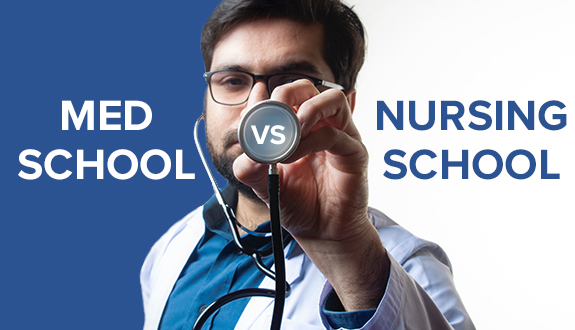
For anyone interested in going into public health, you have an array of options when it comes to your specialization and the particular way that you want to help people improve their health and take care of themselves. Your pathway to becoming a healthcare provider will include making a lot of choices, and the first one is what type of education you want to get. Nursing and medical school are two very valid, but very different pathways to take into the field. Today we’ll be talking about how medical school prep and nursing school prep are different and why you might choose one over the other.
When you think about the type of training that people get to become healthcare providers, most people immediately think of medical students with short white coats and endless hours of residency work. But this isn’t the only choice. Nursing is a highly sought-after profession that is constantly in demand, with a different path to take to begin working. Depending on the type of medicine you’re interested in, how long you want to be in school, and the kind of relationships you want to build with your patients, this may be the right path for you.
Medical vs. Holistic Care
The fact that doctors and nurses work through different methods isn’t surprising, but the extent of that difference is one of the first things you should consider when making your choice. This means that you’ll want to decide if you’re more interested in working under a medical model of care or a holistic model.
Doctors work in what is called a medical model. This means that their focus is on diagnosis and treatment of immediately present issues. While there are specialists who address long-term and chronic conditions, a doctor’s focus is on immediate treatment through things like medication and surgery. In other words, the medical model takes the symptoms that a patient is presenting with and matches them to diagnostic criteria. They then follow the clinical steps that the diagnosis prescribes. The focus then becomes the treatment through referral, immediate treatment, or other forms of care.
Nurses have a much different model of care than doctors, one which is defined as holistic. Holistic healing refers to healing the whole person or body. Nurses are able to take more time for each patient, and in some cases, develop ongoing plans for continued treatment and lifestyle development. This is especially the case with certified nurse practitioners (CNPs) and registered nurses (RNs). Some may specialize in particular areas like burn care, ambulatory care, neonatal care, or any of a number of choices. How specific you want to be in the area you work in is something else to consider when deciding if nursing or medical school is right for you.
Specialization
Specialists in medicine can help treat multi-systemic conditions, provide in-depth care for long-term illnesses, and act as a support system for patients experiencing symptoms that fall outside of general practice. Both doctors and nurses can have specializations. But this means something slightly different for each of them.
Nurses have the opportunity to work in a very broad spectrum of specializations. They may also work in many different areas of a single hospital, or they might even be traveling nurses, working at a variety of institutions depending on their schedules, specialties, and availability. They can also work deeply in one area, building relationships with patients and doctors on a long-term basis. These areas may include neonatal, cardiology, ER, or continuing their education to become a registered nurse. All of these specializations maintain the holistic focus of spending time with and building a system of care for their patients.
Though some decide to focus on family or internal medicine, which lend themselves to broader diagnosis and treatment, doctors often practice within clearly defined specializations, whether it’s oncology, surgery, pediatrics, or any number of areas. However, one place where nurses and doctors differ is that nurses may work in multiple departments or specializations, whereas doctors are more limited to their particular specialty. Deciding if you want to work very deeply in a single area or possibly have the ability to move between or develop multiple specialties can help you decide what direction you want to take.
Time in School
The final difference that you’ll see when you compare nursing to medical school is time. The timeline for becoming a nurse can vary widely, depending on your goals. A practical nursing program will take one or two years to complete, while a Bachelor of Science in Nursing (BSN) will usually take four years to complete, but some bachelor’s programs can be finished in as little as two and a half. A BSN will be of interest if you’re considering becoming a registered nurse or some other advanced, specialized position. After completing one of these programs, nurses will need to take their board exams before they can practice, but some programs include that preparation and testing in their curriculum.
In contrast, medical education will take at least eight years. The first four years are spent in an undergraduate program, learning core science and math topics, and preparing for the MCAT, or the Medical College Admission Test. Studying for the MCAT exam takes time, so make sure to read up on the MCAT study plan that best fits your schedule. After taking the MCAT and getting into a medical school, students spend around four years in medical school, but this can sometimes take longer. Though some programs may choose to train their med school classes in a particular direction, students won’t begin to work toward their desired specialty until after graduation. Clinical experience is also incredibly important for anyone wanting to go into medical school. If you’ve ever wondered how many hours of clinical experience is required for medical school, our resource center can help you learn more about the subject to give you a head start when starting your career path.
Once their academic training is complete, students move into residencies, where they begin to put their training to practical use. This is where medical students are really able to hone in on the type of doctor they want to be, and see what practicing medicine in the real world is like. Depending on your specialty, you may be a resident for anywhere from two to seven years.
Okay, that seems like a really long time, I know, but this isn’t just time spent staring glassy-eyed into textbooks or writing papers about the citric acid cycle. Premed programs build a starting foundation for your scientific understanding, while med school delves into the specifics, strengthening your understanding of how the human body works. Finally, residencies let you put all your practice into play, and you can begin working with real patients and having an impact on their lives. Each step of your education builds on the last and results in a deep understanding of your field and specialty.
So What Now?
If you want to go into the medical field, but aren’t sure exactly what you want to do, the choices can be overwhelming. For those looking for hyper-specialized training and a medical method of treatment, consider making the commitment to medical school. Your training will be long-term, in-depth, and will give you the tools to be anything from a family physician to a specialist in your field.
For those interested in a little bit more mobility, chances at learning across different disciplines, and building an entirely different type of relationship with their patients, nursing school may be a better choice for you. With nursing school, you will be interacting with patients more immediately, and will have the chance to spend more time with them one on one.
Whichever path you decide to take, Blueprint Prep can help every step of the way. Start with exploring our free resources for studying for the MCAT!
Search the Blog

Free Consultation
Interested in our Online MCAT Course, One-on-One MCAT Tutoring or Med admissions packages? Set up a free consultation with one of our experienced Senior Student Advisors.
Schedule NowPopular Posts
-
MCAT Blog What's on the MCAT?
-
MCAT Blog How to Review MCAT Full Lengths

Free MCAT Practice Account
Need great MCAT practice?Get the most representative MCAT practice possible when you sign up for our free MCAT Account, which includes a half-length diagnostic exam and one of our full-length MCAT practice exams.
Learn More







